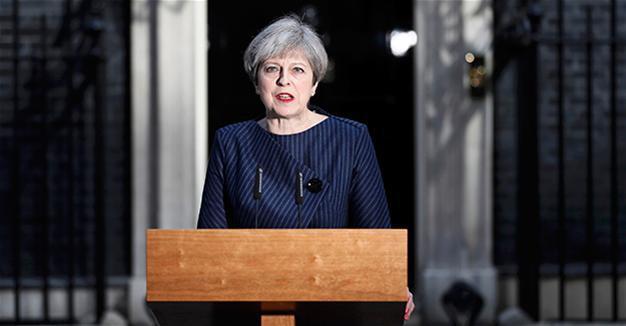May calls for June 8 election before Brexit talks

REUTERS photo
Britain’s Theresa May on Tuesday called for snap elections on June 8, catching the country by surprise in a bid to bolster her position before tough talks on leaving the European Union.
“We need a general election and we need one now, because we have at this moment a one-off chance to get this done while the European Union agrees its negotiating position and before the detailed talks begin,” the prime minister said outside her Downing Street office.
The pound, which has fallen because of the Brexit vote and plunged ahead of May’s announcement Tuesday, rose sharply against the euro and the dollar after it.
Britain started the formal process of leaving the EU last month, but the negotiations are not due to begin for weeks -- giving the prime minister a slim window to increase her support for the battles ahead.
Despite repeatedly rejecting calls from within her Conservative party for an early vote, May has now decided to take advantage of her commanding lead over the main opposition Labour Party in opinion polls.
The margin reached 20 points in the latest polls.
May accused her domestic political opponents of “game-playing” over Brexit.
Most of them oppose leaving the EU, and particularly May’s plans to withdraw from Europe’s single market.
“Division in Westminster will risk our ability to make a success of Brexit and it will cause damaging uncertainty and instability to the country,” she said.
The 60-year-old vicar’s daughter took office after her predecessor David Cameron resigned following the shock vote for Brexit in June 2016.
She has repeatedly insisted that she felt no need to secure a personal mandate - or increase the Tories’ slim majority in the House of Commons - and would wait until the next election scheduled for 2020.
But with the Brexit talks now set to conclude in 2019, and the prospect of some transitional arrangements extending well beyond that date, she has decided to settle the issue early.
“I have concluded that the only way to guarantee certainty and stability for the years ahead is to hold this election and seek your support for the decisions I must take,” May said.
The other 27 EU leaders are set to hold a summit on April 29 where they will agree on a strategy for negotiating Britain’s expected departure in 2019.
The negotiations themselves are not expected to start until May or June at the earliest - and Brussels said this timetable would not change.
The European Commission has said it wants the exit talks to be concluded by October 2018 at the latest, to allow time for the deal to be ratified.
May secured the British parliament’s support to trigger Article 50 of the EU’s Lisbon Treaty last month, starting the two-year countdown to Brexit.
But eurosteptics and europhiles alike are gearing up for further battles over the details of the negotiations - and senior Tories have been urging May for months to try to increase the party’s majority of 17 in the 650-seat Commons.
One European source said on April 18 that May would be better placed to enter the negotiations - and give “concessions” - if she had a stronger hand.
“We have some hope that this will lead to a strong leader in London that can negotiate with us with strong backing by the electorate,” said another.
British election dates are enshrined in law and can be changed only by a two-thirds majority vote in the Commons.
May said she would ask parliament on April 19 to decide on bringing this forward to June 8 - and the main opposition Labour party said it would back it.
“We look forward to showing how Labour will stand up for the people of Britain,” said party leader Jeremy Corbyn.
